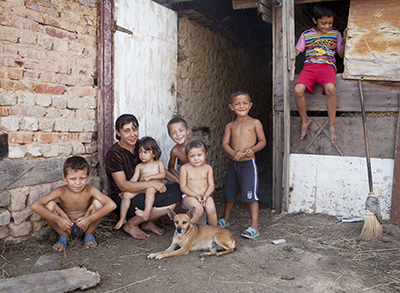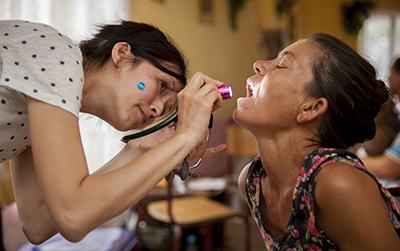If you’ve ever heard of the Roma, it’s likely the romanticized version of brightly clad gypsies drifting carefree in caravans across Europe, setting up camp, stealing the local chickens and dancing until sunrise.
In reality present-day Roma — also known as the Romany — can no longer easily roam across watchful national borders and their wagons now haul any rare treasure liberated from the garbage dumps on which they live. Their neighbors despise, spit upon and hit them if they dare occupy the same sidewalks.
Their poverty is so desperate they wear a layer of dirt like a shirt. They need housing, education, food, clothes, medicine, paved streets, grass to play, gas for stoves, boards to plug drafts in their shacks and shoes for their feet when they step outside to the toilet in below zero temperatures.
 At the invitation of the disaster relief organization Hungarian Baptist Aid, North Carolina Baptist Men and Women on Mission began serving the Roma in their slatternly villages around the Ukrainian city of Mukacheve (known in Hungarian as Munkacs) in 2008. Their task: to refurbish an abandoned KGB station as a community worship, ministry and education center.
At the invitation of the disaster relief organization Hungarian Baptist Aid, North Carolina Baptist Men and Women on Mission began serving the Roma in their slatternly villages around the Ukrainian city of Mukacheve (known in Hungarian as Munkacs) in 2008. Their task: to refurbish an abandoned KGB station as a community worship, ministry and education center.
After a number of trips local Christians said they could complete the building’s refurbishing. What they really needed were people to come and love the unlovable, to shine the light of Christ into the dark recesses of rejection and shame.
The work order changed from carpentry to caring.
Now each summer volunteers hold vacation Bible schools, teach English and generally hang out with kids and families, demonstrating love and acceptance Roma rarely find in their environment.
A spontaneous clinic organized with a few medicines packed by volunteers “just in case” revealed needs so overwhelming that the caring aspect took on a medical tone.
 Videographer K Brown has been to Ukraine 15 times since 2007 as part of his assignment with the Baptist State Convention of North Carolina. His wife, Dana, has been on those trips and three more on her own.
Videographer K Brown has been to Ukraine 15 times since 2007 as part of his assignment with the Baptist State Convention of North Carolina. His wife, Dana, has been on those trips and three more on her own.
Their most recent trip included members and friends from Roxboro (N.C.) Baptist Church, who were visiting for the fourth time.
Jill Burleson, wife of Roxboro Baptist music minister Mike Moose, and a nurse practitioner at Duke University Medical Center, tells describes her first arrival at the Roma village in Mukacheve, which, like so many others, begins where the paved road ends:
“Our van passed a whitewashed brick wall, switching from a quaint village … to a trash heap. Mud roads jostled our insides while we tried to comprehend the stark reality behind that wall: Filth, trash, mud, disease, houses crafted crudely out of sticks or mud, roofs patched with cardboard and trash to hold it in place.
“Children with naked brown bodies and swollen bellies from malnutrition ran alongside the van to cheer and wave. Their dirty faces strained to make out these strangers coming to visit. The need was overwhelming. And the tears began.
“Those tears were soon dried by mamas and children clamoring to hug, kiss and engulf us into their fold as if we were family. We entered a building, from which a melody came floating lightly, joyously, on the putrid air, turning the stench of the trash into a holy aroma rising to the heavens. And there we worshiped.”
Ann Enloe, an oncology nurse at WakeMed Health and Hospitals in Raleigh, N.C., says, “I actually never knew the Roma gypsies existed until this trip. And now I just can’t forget them.”
 No visitor leaves these Roma unaffected.
No visitor leaves these Roma unaffected.
They worship passionately, says music minister Moose. True worshippers come to God with empty hands, he adds. “Our hands are so full we have to put things down to worship. They [the Roma] have nothing in their hands. God is all they have. It is precious. When they sing Blessed Be Your Name they really mean it. It’s emotional to hear them sing.”
On his first trip to Mukacheve, Moose slipped off a boardwalk and into the meandering, muddy drainage ditch that passes as a street. He smelled foul to himself, but not to a little child who wanted to play.
“I smelled just like he did,” Moose says. “It was an identification. Their love runs so deep, beyond the smell, beyond the filth. It is a precious gift to be with those people.”
That slurry of mud and sewage into which Moose stepped flows dangerous and constant. It is a vein that stains the village and illustrates the poverty that makes children its most poignant victims.
Trish Long, a pharmacist at Duke Regional Hospital in Durham, N.C., and a member of Roxboro Baptist, explains:
“Because of lack of basic medical care and poor nutrition, simple summer colds can become serious lung infections. Children with no shoes walking in mud develop abscesses on their feet and legs from the many cuts and sores.
 “Poor sanitation and filthy living conditions lead to parasite infestation, chronic diarrhea, and weight loss in an already underweight child. For some of these children, this can lead to serious life threatening conditions.”
“Poor sanitation and filthy living conditions lead to parasite infestation, chronic diarrhea, and weight loss in an already underweight child. For some of these children, this can lead to serious life threatening conditions.”
“Is the medical attention, vitamins and medicine our groups provide just a band-aid?” Brown asks. “Yes. We take worm pills for the kids. Three months later, they’ll have worms again with constant diarrhea and trips to the outhouse through mud and snow. But for three months they’ve felt better than they can remember. I’ll take three months.”
In the village where K and Dana are treated as family and no longer as visitors, one tap provides water for 25 homes — when it flows. Other area wells bore first through garbage dumps, drawing water polluted with the residue leaching through the soil.
It didn’t take long — just the first hours — for the initial medical team to understand their reason for being there.
A woman named Lilly came to the clinic in severe distress. Several weeks earlier her dress had caught fire while she was sifting through the garbage, looking for anything useable to eat, wear or sell.
Despite third degree burns over much of her body, she was sent home from the hospital in Mukacheve with little attention and no pain medication. Had she been in North Carolina, one of the nurses said, she would have been in a burn unit for a month.
 Her underwear was never removed and she was using a rag for a bandage. Skin started to grow back with the fabric attached. The pain would have been excruciating.
Her underwear was never removed and she was using a rag for a bandage. Skin started to grow back with the fabric attached. The pain would have been excruciating.
In the moment they met Lilly the team knew they’d come to Mukacheve for her. They spent two hours removing the fabric that had grown into her skin, gently cleaning the wounds and easing her pain.
“She came back every morning for continued treatment and her transformation was amazing — from a withdrawn blank stare to an enormous smile and gentle hugs,” said Jill.
Burns are common among Roma because of open flame cooking, in both outside pits and small stoves in the middle of their 12 x 12 houses. Latent injuries lurk in the smoldering garbage piles in which they sift for salvageable items.
DuPre Sanders, pastor of Roxboro Baptist Church, has not been to Mukacheve, but has traveled to Guatemala and Belize where members also are involved in international missions. They revisit sites to establish relationships, rather than conducting one stop drop-ins.
“Those who go know the people,” he says. “They care about the people. They care about the churches and the work that is being done and those relationships grow as you go.
“Every time they come back and share their stories there is renewed energy for the work there.”
Missions involvement helps Roxboro members “understand the importance of being a part of something bigger than we are. It’s helped us reach outside the walls of our church and not be inward focused.”
Roxboro’s involvement overseas and locally with Stop Hunger Now and Operation Inasmuch, is “good for us,” Sanders says.
“We’re a traditional Baptist church on Main Street in a traditional, small Southern town. These efforts broaden our horizons greatly. We’re Kingdom people who are called to serve with other believers in the kingdom.”
—This article was first published in Herald, BNG’s magazine sent five times a year to donors to the Annual Fund. Bulk copies are also mailed to BNG’s Church Champion congregations.
